AMD Radeon HD 7970 GHz Edition Review: Battling For The Performance Crown
by Ryan Smith on June 22, 2012 12:01 AM EST- Posted in
- GPUs
- AMD
- GCN
- Radeon HD 7000
Compute Performance
Shifting gears, as always our final set of performance benchmarks is a look at compute performance. As we saw with the launch of the GTX 680, Kepler (GK104) just doesn’t do very well here, thanks in part to NVIDIA stripping out a fair bit of compute hardware and memory bandwidth on GK104 in order to focus on gaming performance. OpenCL performance is particularly bad with NVIDIA almost completely ignoring it, but even DirectCompute performance often swings AMD’s way. This isn’t to say that GK104 doesn’t have its moments, but when it comes to compute it’s typically AMD’s time to shine.
Our first compute benchmark comes from Civilization V, which uses DirectCompute to decompress textures on the fly. Civ V includes a sub-benchmark that exclusively tests the speed of their texture decompression algorithm by repeatedly decompressing the textures required for one of the game’s leader scenes. Note that this is a DX11 DirectCompute benchmark.
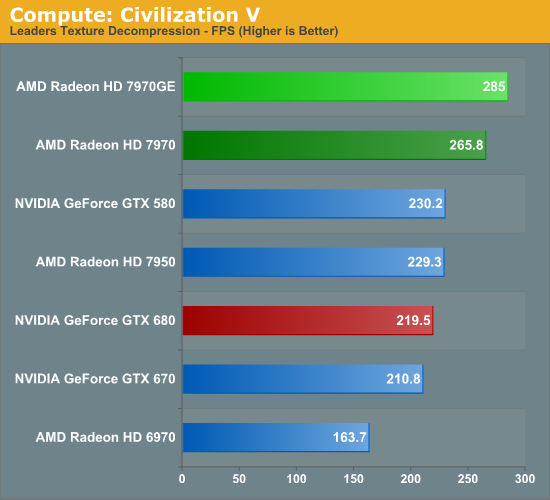
The 7970 already had a significant lead in this benchmark thanks to AMD’s work on improving their DirectCompute performance, and the 7970GE extends it further. The most important factor of course is actual game performance – where the 7970GE and GTX 680 are tied – but this is clear software evidence of what we already know in hardware: that the 7970GE is far more potent at compute than the GTX 680 is.
Our next benchmark is SmallLuxGPU, the GPU ray tracing branch of the open source LuxRender renderer. We’re now using a development build from the version 2.0 branch, and we’ve moved on to a more complex scene that hopefully will provide a greater challenge to our GPUs.
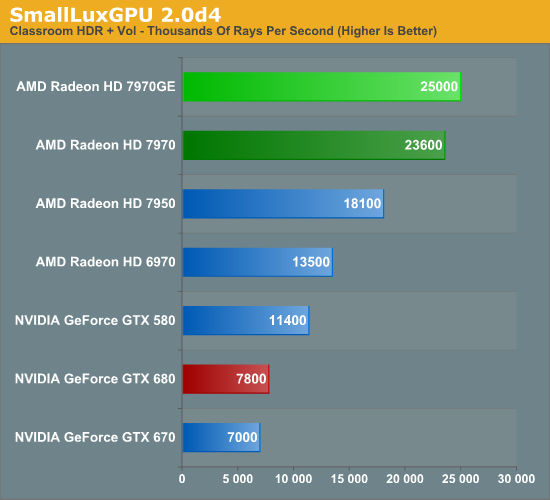
Being an OpenCL title that NVIDIA isn’t taking any care to optimize for, the 7970GE simply blows the GTX 680 out of the water. It’s not even a contest here. Only one card family is even worth consideration for use here. However it’s interesting to note that the 7970GE’s performance improvement over the 7970 is a bit below average, with the 7970GE only picking up 6%. SLG does stress memory bandwidth and compute performance, but in all likelihood the 7970GE isn’t boosting as much here as it is under our gaming tests. Once AMD starts exposing real clockspeeds we’ll need to revisit this assumption.
For our next benchmark we’re looking at AESEncryptDecrypt, an OpenCL AES encryption routine that AES encrypts/decrypts an 8K x 8K pixel square image file. The results of this benchmark are the average time to encrypt the image over a number of iterations of the AES cypher.
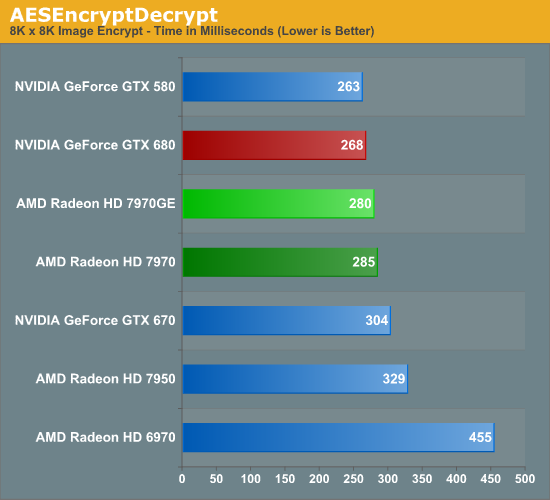
While the 7970GE does improve upon the 7970’s already strong performance, we’re clearly reaching the point where the relatively long CPU/GPU transfer times over PCIe are taking their toll, explaining why the 7970GE could only shave off 5ms. This is actually an important point to make and is why APUs are so important to AMD’s GPU computing plans, but it also means that at a certain speed GPU performance ceases to matter.
Our fourth benchmark is once again looking at compute shader performance, this time through the Fluid simulation sample in the DirectX SDK. This program simulates the motion and interactions of a 16k particle fluid using a compute shader, with a choice of several different algorithms. In this case we’re using an (O)n^2 nearest neighbor method that is optimized by using shared memory to cache data.
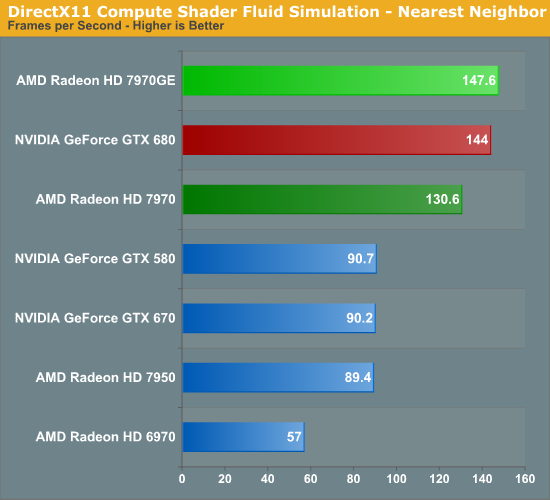
In this final compute shader benchmark NVIDIA’s performance is actually quite respectable, leading to them besting the 7970. However the 7970GE provides just enough of a performance boost to push AMD ahead of NVIDIA here, giving AMD a solid majority of our standard compute benchmarks. Even when Kepler is faced with a favorable workload, it looks like GCN based 7970GE is capable of taking NVIDIA head-on.
Finally, we received a number of requests for some further compute benchmarking using some of the consumer programs AMD provided the press with for the Trinity launch. In particular WinZip and handbrake were requested, so we’ve gone ahead and run those benchmarks for this review.
Starting with WinZip, WinZip 16.5 introduced OpenCL acceleration of both compression and AES achieve encryption. Despite being accelerated via OpenCL WinZip only supports AMD devices, presumably because only AMD provided technical assistance. As a result we’re looking solely at pure CPU performance and GPU accelerated performance across AMD’s lineup.
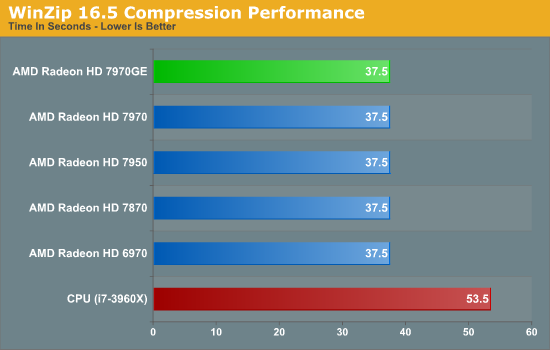
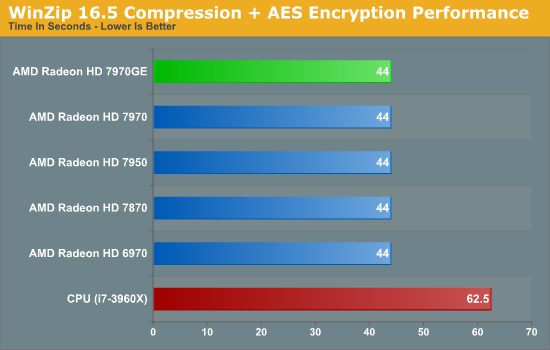
One thing immediately sticks out: WinZip isn’t very sensitive to GPU performance. Merely having a GPU increases performance rather significantly, but it doesn’t matter if it’s a fast GCN card or a GCN card at all for that matter, as even the VLIW4 based 6970 returns the same times. In fact AMD’s drivers report almost no GPU load, so it’s questionable how much of this is actually being run on the GPU versus being run on the CPU through AMD’s OpenCL CPU driver.
As for Handbrake, AMD sent along a newer version that works with discrete GPUs. AMD notes that this is still very much a work in progress, which we saw first-hand when OpenCL acceleration failed to handle two of our three test clips. It failed to properly crop one video, and failed to properly detelecine another. Handbrake’s OpenCL acceleration will of course continue to improve as it approaches release, but for the time being it’s definitely a beta.
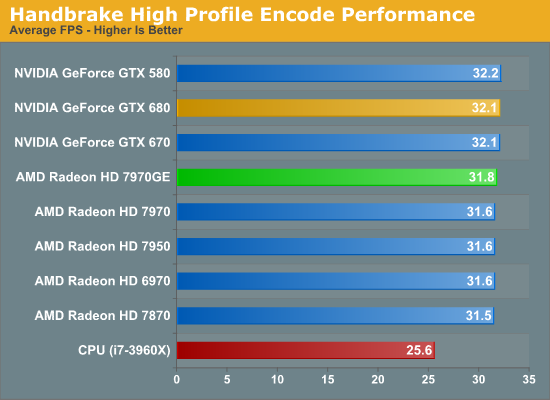
Much like WinZip, Handbrake doesn’t appear to be particularly GPU performance sensitive, which doesn’t come as much of a surprise. Large parts of the H.264 encoding process are ill suited for GPU acceleration, so X.264 is only offloading part of the process and the deciding factor is still CPU performance. The actual GPU load is very inconsistent, but generally tops out at around 40% usage.
The end result is nothing to sneeze at however. Whereas Handbrake averaged 25.6fps without GPU acceleration, with it performance increases by 24% to around 32fps. And unlike other GPU compute accelerated encoders the quality here is very consistent between the CPU and GPU paths (though GPU file size tends to be a bit larger), which means we’re retaining the same quality and customizability of Handbrake/x264 while gaining additional performance for free.
Despite the fact that this is an AMD backed initiative it’s interesting to see that Handbrake’s performance isn’t heavily reliant on the GPU being used. We would have assumed that Handbrake was only optimized for AMD’s GPUs at this point, and even if that’s the case NVIDIA’s GPUs are still fast enough to make up the difference. The fact that Handbrake performance with NVIDIA’s GPUs is a hair faster is not at all what we would have expected, but at the same time this is very beta quality software and is likely dependent on the clip being used, so we wouldn’t advise reading too much into this at this time.










110 Comments
View All Comments
AnnihilatorX - Friday, June 22, 2012 - link
"All the same AMD has also boosted their memory clocks from 5.5GHz to 6GHz, which will give the card 9% more memory bandwidth with it needs it."=>
"when it needs it"
raghu78 - Friday, June 22, 2012 - link
RyanAs you mentioned Dirt Showdown will take the place of Dirt 3 in your test suite I would like to make a suggestion that a few more games be changed. Max Payne 3 and Alan Wake are good changes. Maybe Crysis Warhead could be replaced by Alan Wake and Portal 2 by Max Payne 3. Another very demanding game which could find a place is Witcher 2 Enhanced edition. Focusing on games released in the last 12 months in your test suite helps prospective buyers / gamers decide based on performance on recent titles which they will most probably be playing.
HighTech4US - Friday, June 22, 2012 - link
You are showing the OCed version of the 7970e in comparison to the stock GTX680.For fairness the stock GTX680 should be Overclocked also.
kyuu - Friday, June 22, 2012 - link
There's nothing fair or unfair about overclocking. Why do people bring this up every time there's one of these articles...CeriseCogburn - Saturday, June 23, 2012 - link
Good to hear it this time, as all the prior moaning has been amd fans wailing that the 680 core is already overclocked out of the box !L M H O
I just want to see the 470, 480, 570, and 580 at the equivalent radeon clocks for those series, and see amd get SPANKED even more in those series.... to be fair, of course....
Yes, thanks so much for saying "you guys always say it" - no - it's not "you guys" - it's the amd fan boys !
This time they didn't moan and complain about fairness, because amd got beat anyway, and they wouldn't if it won, which it did not, I must point out, feeling the overwhelming need to state, again, and again.
This sums it up well: AMD loses, as usual
seapeople - Friday, June 22, 2012 - link
They're also comparing the OCed version of the 7970e to the stock 7970e. That seems unfair to me. To be fair, you should only compare the OCed 7970e to itself, the OCed 7970e.Arbie - Friday, June 22, 2012 - link
It's probably too late now, but there were at least three more places where you could have used "performance crown" in the opening paragraphs.
CeriseCogburn - Saturday, June 23, 2012 - link
Amd LIED, with their false advertising about this card - their hot loud slow housefire...Amd is an evil corporate monster who lies to the little children they sell their products to (and to soccer Mommies who actually pay the card price to keep the lies going - granted they pay less than Abu Dhabi oil sheiks)
Wreckage - Friday, June 22, 2012 - link
Another successful paperlaunchI'm not sure why they could not wait until they had actual product available.
behrouz - Friday, June 22, 2012 - link
AMD Radeon HD 7970 GHz Edition = $499AMD Radeon HD 7970 = $549 ? or $449 ?